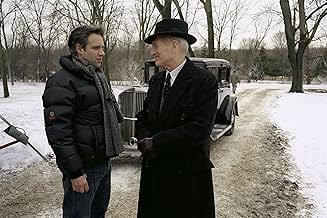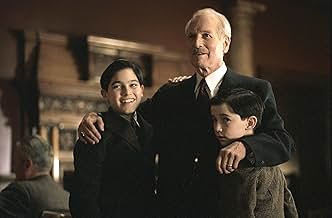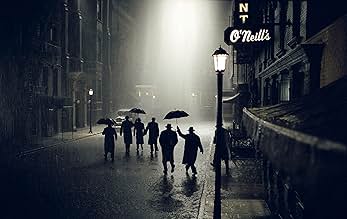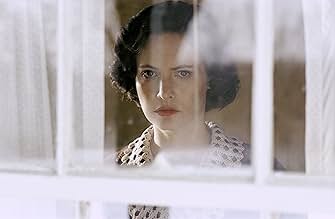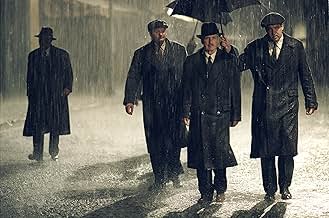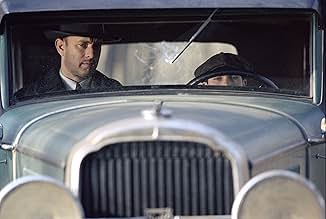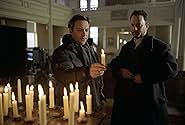Les sentiers de la perdition
A mob enforcer's son in 1930s Illinois witnesses a murder, forcing him and his father to take to the road, and his father down a path of redemption and revenge.A mob enforcer's son in 1930s Illinois witnesses a murder, forcing him and his father to take to the road, and his father down a path of redemption and revenge.A mob enforcer's son in 1930s Illinois witnesses a murder, forcing him and his father to take to the road, and his father down a path of redemption and revenge.
- Director
- Writers
- Stars
- Won 1 Oscar
- 23 wins & 82 nominations total
- Finn McGovern's Henchman
- (as Stephen Dunn)
- Director
- Writers
- All cast & crew
- Production, box office & more at IMDbPro
Featured reviews
Of course, the acting ain't bad when you have Tom Hanks and Paul Newman playing the leads! The amount of action in here is just right, too: not too much; not too little.
None of the characters in here, frankly, are "good guys" as Hanks is a professional hit-man for town boss Newman. Hanks' only redeeming quality is not wanting his young son to wind up a killer like him, although he does teach him how to be the getaway man in robberies! Huh?
As good as the acting is and as interesting as the story is, the real star of this film is cinematographer Hall, who paints scene after beautiful scene with his lens. His work is just awesome.
It has a combined intensity and lightness of touch that won't work for anyone who wants the typical fast-paced action flick. If we lived in Elizabethan days, I'd say this movie's a bit like a Shakespearean tragedy. But since we don't, let's say it's more like a Drama-Suspense movie.
The plot is simple, but the story is complex. The movie is intelligent in the way relationships and issues are explored. Much of the story is shown rather than told, which I find makes it more subtle and moving - and which also works well for a story based on a comic book (or graphic novel). At times I felt I was actually there in the 1930s, part of this story - there was such a realistic yet dream-like quality in the style of its telling.
I don't often prefer movies to the books they were based upon, but in this case I do. (Though I did enjoy the book too.) I've bought the DVD, which is great because it has some wonderful deleted scenes and insightful commentary.
(I also took my little cousin, who's a little younger than the boy in the movie, to see it after I saw it for the first time, because he has issues at home and I wanted to use this as a way of starting a discussion on father-son issues with him. He loved it - and the discussion.)
Michael Sullivan junior is a twelve-year-old schoolboy from Rock Island, Illinois. Although it is the early 1930s, the time of the Great Depression, the Irish-American Sullivan family enjoys a comfortable upper-middle-class existence. Young Michael, however, is puzzled about what his father, Michael senior, actually does for a living; all he knows is that he works for John Rooney, a seemingly respectable elderly gentleman who treats the boy like an adopted grandson. The truth, however, is that Rooney is an organised crime boss and Michael senior his "enforcer" When young Michael stumbles on the truth, after witnessing Rooney's unstable son Connor killing another gang member, he inadvertently puts himself and his family in danger. In an attempt to eliminate the boy, Connor murders his mother Annie and younger brother Peter, forcing Michael and his father to flee for their lives. The rest of the film deals with Michael senior's search for revenge for the deaths of Annie and Peter.
The title can be understood on a number of levels. On the most literal, Perdition is a town to which some of the characters travel at the end of the film. On another level, "perdition" can be interpreted as meaning "death" or "destruction", and on a third "eternal damnation". Perhaps the film's bleakest moment comes when Rooney says to Michael senior that "none of us have any hope of getting to Heaven". This is not just a figure of speech. Rooney is a practising Catholic who has nevertheless embarked upon a way of life which he believes can only result in his damnation to Hell. The film's emphasis on the futility and sterility of the criminal lifestyle is reminiscent of that great British gangster movie, "Get Carter".
The bleakness of the film's moral message is emphasised by its visual style, dominated by a muted palette with dark backgrounds and dull greens and greys. Filming took place in winter and early spring, often against a backdrop of snow and rain; Mendes intended the cold, bleak look of the film to reflect the characters' emotional states. Water, snow and ice are recurrent visual images throughout, from the snowy opening funeral scene with a corpse on ice to the closing scenes by Lake Michigan. The film's emotional impact is also heightened by Thomas Newman's evocative, elegiac musical score.
The film's two most important characters are Michael senior and Rooney, who loves Michael like a son, and yet tries to kill him to save his biological son Connor. In some ways the audience can sympathise with Michael, a man who has suffered unjustly through the deaths of two innocent family members, and this sense of identification is strengthened by the casting of Tom Hanks, an actor normally seen as sympathetic characters. On another level, however, we recognise Michael's moral responsibility for his own predicament as one of those who live by the sword and are therefore doomed to die by the sword as each killing fuels the cycle of revenge and leads to yet more bloodshed. This is one of Hanks's most accomplished performances as he is able to show both these sides of Michael's personality. One of his redeeming characteristics is his love for his son, who he hopes will be able to lead a better life than the one he himself has led, and the film ends on a note of hope in this regard.
This was to be Paul Newman's last appearance in a feature film, and it was to be a fine end to his distinguished career. Although Rooney is a lifelong villain, he is not wholly evil, but a tired, disillusioned old man, in Wilfred Owen's phrase a "devil sick of sin", who retains enough moral awareness to realise that his false system of values has blighted his life and the lives of others. The other notable performance comes from an almost unrecognisable Jude Law as Harlen Maguire, the hit-man sent by Rooney to kill Sullivan. Maguire also works as a crime-scene photographer, and the relish with which he photographs murder victims reveals a macabre fascination with death. In his remorselessness Maguire recalls Anton Chigurh, the hit-man played by Javier Bardem in "No Country for Old Men", although to my mind Law gives a better performance than Bardem. Maguire, for all his evil, is a recognisable human being whereas the one-dimensional Chigurh seems more like a personification of some abstraction such as "death" or "fate".
The "my own Godfather" syndrome means that the organised crime epic has become something of an overcrowded field in the last forty years, but I must say that "Road to Perdition" is one of the most impressive entries in that field. I was impressed by Conrad Hall's breathtaking cinematography, by the standards of acting and by an intelligent script with its themes of father-son relationships, of the ethics of revenge and of the consequences of violence. Above all I was impressed by Mendes's ability to weave all these elements into a mythic whole, an epic which manages to say something new in the otherwise clichéd gangster genre. When I reviewed "American Beauty" I said that Mendes had joined that elite group of directors (Orson Wells, Sidney Lumet, Bryan Forbes, Stuart Rosenberg) who had made a masterpiece with their first film. With "Road to Perdition" he has joined that even smaller group who have made masterpieces with their first two films. 9/10
Based on the dark graphic novel by Max Collins and Richard Piers Rayner adapted faithfully by David Self. Anyone with a fondness for mobster movies will find quite a bit to admire this fabulous film . This is a magnificent picture , except that the yarn turns so much bathetic and extremely sentimental , at times . This thought-provoking material blends comic-strip , a tridimensional kid's eye pastiche and ordinary mobster movie , though remains fundamentally in comic-book wake . Cast is pretty well , giving outstanding acting . Highlighted by Hanks' acting as father down a path of redemption and revenge , though some critics state Tom is fatally miscast . Paul Newman as mob boss and Daniel Craig are good , the latter as the rutlhess partner in crime . Jude Law as the terminally self-conscious hit-man steals of show as a whacked weegee-style photographer . Other prestigious actors appearing are the following ones : Dylan Baker , Ciran Hinds , Jennifer Jason Leigh and Stanley Tucci as Frank Nitti
The film packs a colorful and glimmering cinematography by Conrad Hall , who previously brought American Beauty , to whom the film is dedicated . It was shot in various locations as Grand Rapids, Saugatuck, Zeeland , Michigan , Pullman , Chicago , Geneva , Evanston , Momence , Beecher , Thornton , Illinois . As well as sensitive and rousing musical score by Thomas Newman. Being lavishly produced by Joan Bradshaw , Walter F. Parkes , Dean Zanuck , Richard D. Zanuck and Sam Mendes himself . This gangster picture was well directed by Sam Mendes , though with no originaly . Mendes is a good director who has made some successful films played by important actors , such as : Jarhead , American Beauty , Revolutionary road , this Road to perdition and two Bond movies : Skyfall and Spectre . Rating: 8/10 . Above average. Well worth watching . Essential and indispensable watching .
Did you know
- TriviaFor the bank robberies sequence, Tyler Hoechlin (Michael Sullivan, Jr.) had to learn to drive, something he was only too happy to do. Hoechlin mastered it all easily, but, just to be on the safe side, a stunt driver was sitting in the back, with his own set of driving controls.
- GoofsIn that era, gentlemen removed their hats indoors, particularly in places like diners. Even not-so gentlemen. To not do so would have attracted attention.
- Quotes
Michael Sullivan, Jr.: So when do I get my share of the money?
Michael Sullivan: Well... how much do you want?
Michael Sullivan, Jr.: Two hundred dollars.
Michael Sullivan: Okay. Deal.
[Michael Jr. stops eating and thinks for awhile]
Michael Sullivan, Jr.: Could I have had more?
Michael Sullivan: You'll never know.
- Crazy creditsThanks to all at the Donmar Warehouse Theatre, London
- ConnectionsFeatured in The Making of 'Road to Perdition' (2002)
- SoundtracksWhose Honey Are You?
Music by J. Fred Coots (as Fred J. Coots)
Lyrics by Haven Gillespie
Performed by Ruth Etting
Courtesy of Take Two Records
Details
- Release date
- Country of origin
- Official site
- Language
- Also known as
- Camino a la perdición
- Filming locations
- Production companies
- See more company credits at IMDbPro
Box office
- Budget
- $80,000,000 (estimated)
- Gross US & Canada
- $104,454,762
- Opening weekend US & Canada
- $22,079,481
- Jul 14, 2002
- Gross worldwide
- $181,001,478
- Runtime1 hour 57 minutes
- Color
- Sound mix
- Aspect ratio
- 2.35 : 1
Contribute to this page





